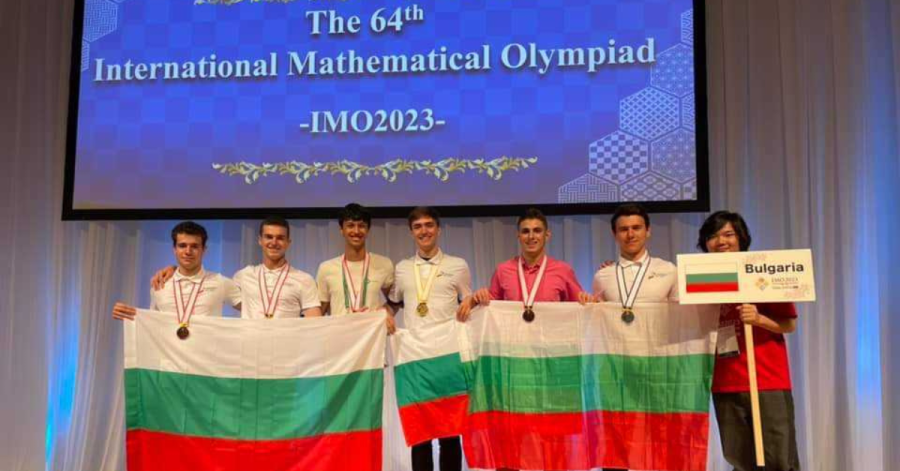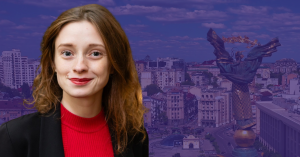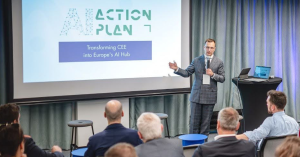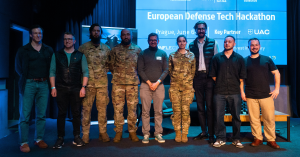It was a fruitful summer for Bulgaria at the International Olympiads in the STEM field. Bulgarian high-schoolers performed impressively, winning 4 medals in geography, 3 medals in biology, 4 in physics, 6 in mathematics, 4 in chemistry, and 4 in informatics.
Bulgaria is one of the countries in the CEE region with strong traditions in the STEM field but what drives young mathematicians now to dream for international success?
The Recursive sat down with Marin Hristov, a final year student at the Sofia Mathematics High School, who won a gold medal at the Mathematical Olympiad, and professor Stanislav Harizanov, a mathematician and scientist at the Institute of Mathematics and Informatics at the Bulgarian Academy of Sciences and the coach of the Bulgarian National Mathematics team to find out.
One tradition continues
According to professor Harizanov the tradition set by the previous generations inspires the youngsters to keep on building on their success.
”The people who are graduating high school and who have won medals at Olympiads are willing to be role models to the youngsters. They come back, they teach and they really serve as models to the youngsters”, the coach explains.
„For me mathematics is incredibly rich and beautiful. I find combining complex ideas and dealing with changing problems very fascinating”, Marin shares, adding that his passion for the subject was ignited by his high school teacher Ivan Simeonov, whose love and deep understanding for mathematics motivated Marin to spend countless hours preparing for competitions. “I’m extremely thankful for his mentorship and advice over the years. I won’t be here without him”, Marin says.
But the inspiration goes both ways, says prof. Harizanov as teachers also get inspired by the energy, the new ideas and approaches that the students bring. He adds that the strong foundation of the Bulgarian educational systems in mathematics has also contributed to their success. For example in the high schools where you can majorise in mathematics, students have the opportunity to study the subject in detail and spend more time exercising their skills.
Mathematicians are professional athletes
Preparing for the International Mathematics Olympiad requires as much dedication as that of a professional athlete preparing for their next competition. The students in the Olympic team devote all their free time to solving mathematical problems. They have to prepare both mentally and physically and like in any other sport they have to make some sacrifices to achieve their goal.
According to prof. Harizanov there’s a good synergy between high school teachers, university lectures, the research from academia and former participants who come every summer to the preparation camps to help train the young mathematicians and lift their spirits before the competition.
For the gold medalist Marin Hristov the most important quality of a good mathematician is to be able to translate complex problems in a way that is natural for a person to understand. “There are a lot of complex ideas to go over which are hard to grasp at first reading. One has to be very lenient towards their failure in the beginning because it’s not always an easy path”, Marin adds.
The liberty to try your own approach
And yet there’s this paradox that although the Bulgarian National Team yields success at international competitions, the general level of students in Bulgaria in mathematics is deteriorating. For the year 2023, the average success rate is 57.44 points out of a maximum of 100. The matriculation exam in mathematics is taken by students who have profiled this subject for 2 years.
In recent years, the Ministry of Education and Science has tried to solve this problem by moving material from the curriculum from lower to upper classes and vice versa.
But according to prof. Harizanov the main problem is that education in Bulgaria hasn’t changed much for 50 years. He believes a new approach is needed, so that students do not just passively sit and memorize, but apply the material in real-life situations and have the liberty to think and come up with their own solutions.
STEM education offers exactly this hands-on approach to studying that combines different tools and applies a dynamic mathematical software. „All contemporary technology is involved in STEM education, so I think this is something which should be explored“, says Prof. Harizanov.
The Bulgarian Ministry of Education and Science is working on a project that aims to build a comprehensive STEM education environment in Bulgarian schools. According to this plan every Bulgarian public or municipal school should have a STEM center by 2026. The project is part of the National Recovery and Resilience Plan. 250 STEM centers have already been built as part of the program.
However, the construction of STEM centers itself doesn’t change the approach to education. “Even though we have STEM centers, every school should follow more or less the same program or the same curriculum, which I don’t think gives freedom to both students and teachers to use STEM tools in the learning process”, prof. Harizanov adds.
The future realization of the STEM talents
The gold medalist Marin Hristov’s dream is to study mathematics in a top university either in the United States or in the UK. After graduation, he is confident that he wants to develop as a professional in Bulgaria.
„I think more and more bright minds should come back at some point to help our local community rather than splintering their potential around the globe“, the student believes.
“Мy goal before graduating is to inspire others. I realized that I’m in the position of being somewhat of a role model for youngsters and I want to give back to the community by leading them onto the same path”, Marin adds.
But are there any opportunities for professional development in the STEM field in Bulgaria?
Prof. Harizanov believes that the right infrastructure and experts are already in place. There are plenty of training programs for teachers who want to explore STEM education for example. And having a research institute like INSAIT where top researchers from all over the world come and share their experience with PHD students and undergraduate students lays the ground for Bulgaria to become one of the top countries in AI innovation in the near future, the professor is certain.







